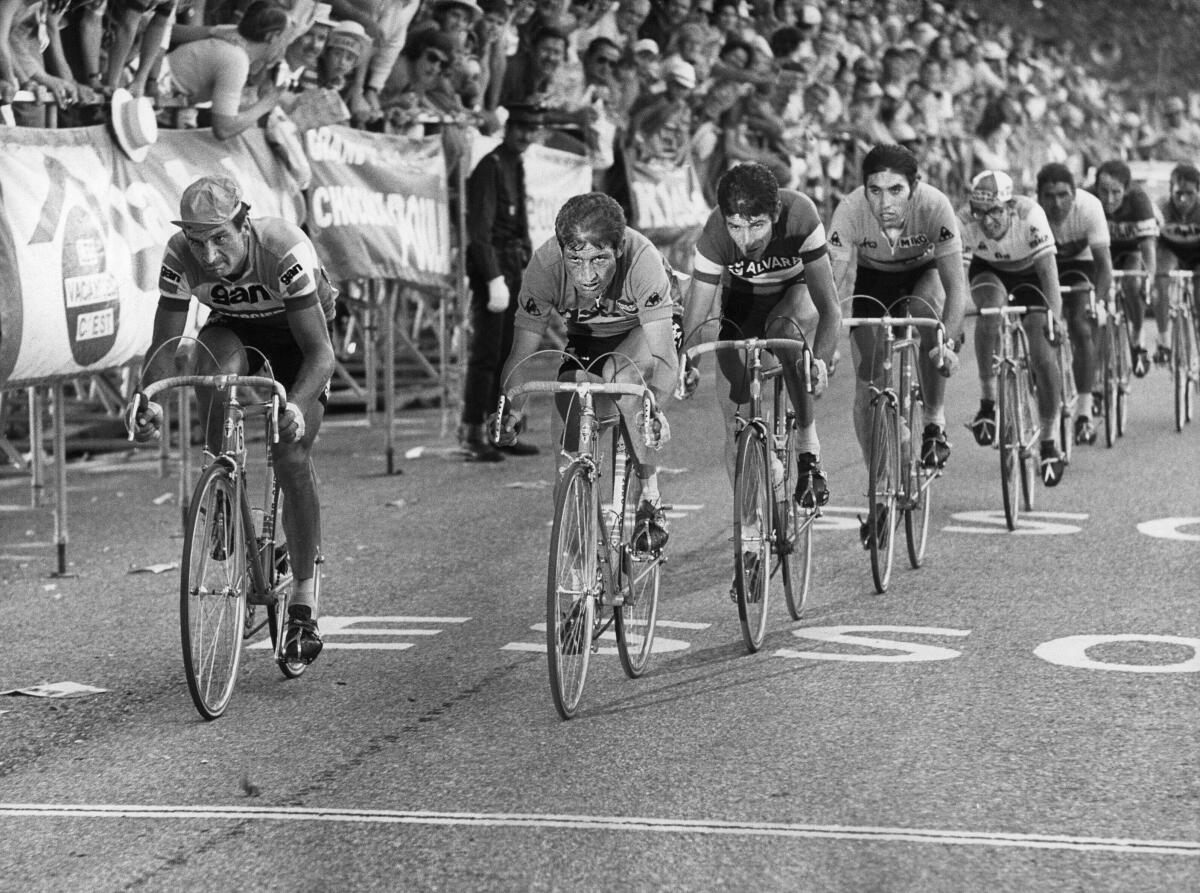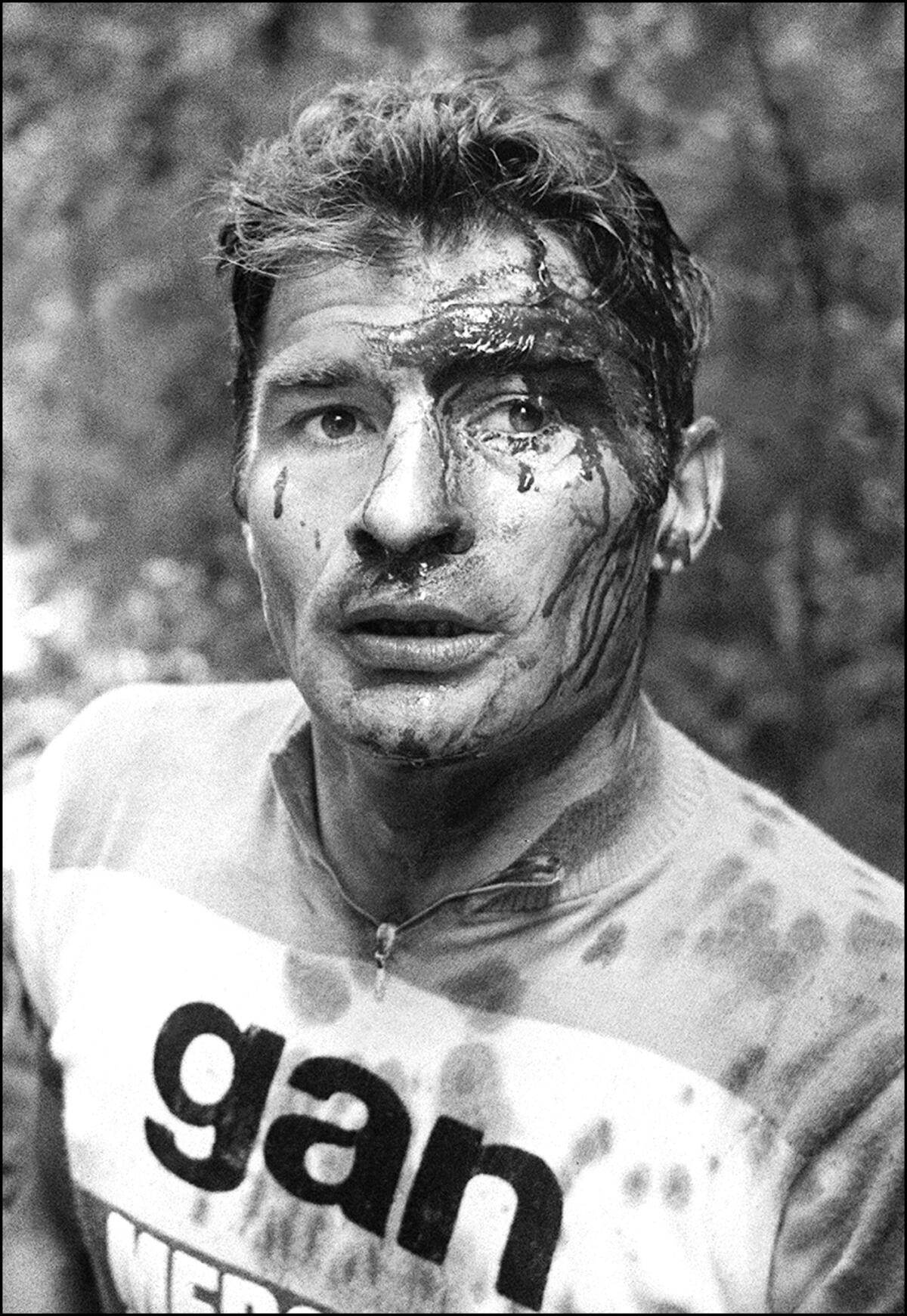Raymond Poulidor, the ‘eternal runner-up’ of the Tour de France, dies at 83

- Share via
Raymond Poulidor, the “eternal runner-up” whose repeated failure to win the Tour de France helped him conquer French hearts and become the country’s all-time favorite cyclist, has died. He was 83.
Decades after his career ended, Poulidor was still adored in a nation where sports fans love to pull for “magnificent losers.” The fact that he never wore the yellow jersey — and never quite got the better of his rivals Jacques Anquetil and Eddy Merckx — became his trademark.
Outside cycling’s circles, his status eclipsed even the achievements of Anquetil and Bernard Hinault, the two French members of the elite club of five-time Tour winners.
“His feats, his panache, his courage will forever remain engraved in our memories,” French President Emmanuel Macron said. “Poupou, forever the yellow jersey in French hearts,” he said, using Poulidor’s nickname.
Over his 17-year career, Poulidor secured a record eight podium finishes at the Tour de France, cycling’s showpiece event, but could never reach Paris in the famed yellow tunic worn by the race leader after each stage.
“The cycling world loses a monument, an icon. You cannot imagine how much Poupou was loved in France,” Merckx, another five-time Tour winner, said.
Poulidor died early Wednesday in his hometown of Saint-Leonard-de-Noblat, in central France, according to town officials.
He had been hospitalized last month after a bout of fatigue this summer during the Tour, where he worked every year as an ambassador for the yellow jersey’s sponsor. Though he never got to wear it during his racing career, he donned a yellow shirt every day for this role during the grueling race.
The son of sharecroppers, Poulidor took part in 14 Tours from 1962 to 1976. He finished in second place three times and was third five times.

A lovable and down-to-earth competitor, he kept the same warmth and approachable manner after his career ended, always up for a chat with his admirers and ready to sign autographs or pose for pictures.
Fans loved the genial Poulidor across the country. Two years ago, he shared a warm greeting with Macron after a stage of the Tour’s 104th edition.
“He was a man of the people and never forgot where he came from,” Tour director Christian Prudhomme said. “He spoke to people in the same manner, no matter if they were the French president or fans lining up the roads.”
Poulidor turned professional in 1960 and achieved much success with the French Mercier team before he retired in 1977, a year after he finished third in his final Tour de France, behind Lucien Van Impe and Joop Zoetemelk, at the age of 40.
His career came during an era of greatness in cycling and wedged him between two superbly strong riders in Anquetil and Merckx.
Despite falling just short at the Tour, Poulidor was more than merely a second fiddle. He was an all-rounder graced by great climbing skills and posted prestigious wins at the Milan-San Remo and Walloon Arrow classics, the Spanish Vuelta — his only Grand Tour win — and the Paris-Nice stage race.
In 1962, he made his Tour debut with a broken finger and put on a great show in the Alps to win a daunting stage featuring five climbs with a commanding three-minute lead.
Two years later, Poulidor started the 1964 Tour as the favorite, having won the Vuelta earlier that year. After dropping Anquetil during a Pyrenean stage, he reached the top of the Port d’Envalira climb with a three-minute lead over his cycling nemesis. But Anquetil rode at breakneck speed in the descent to catch up with his rival before Poulidor hit the tarmac in the fog and eventually lost two minutes.
At the 1968 Tour, he was involved in a serious crash after a motorbike knocked him over and fell on top of him.
“When I was hit by the motorbike, I was almost dead on the side of the road,” Poulidor said years later.
Despite all the hard luck, Poulidor wasn’t bitter.
“I was unlucky, but the bike brought me more than it cost me,” he once said, summing up his career.
More to Read
Start your day right
Sign up for Essential California for the L.A. Times biggest news, features and recommendations in your inbox six days a week.
You may occasionally receive promotional content from the Los Angeles Times.






